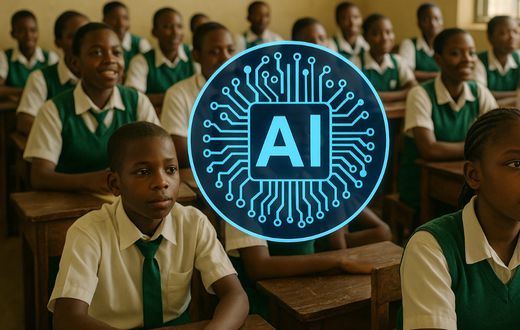Recent data released by Google Search Trends revealed that Nigerian students have embraced AI as a study partner
The data released by Google showed that the reliance on AI by Nigerian students surged by 200% in 2025 compared to 2024.
According to the data, searches combining “AI” and “studying” surged by over 200 per cent compared with 2024.
Also, overall search activity related to AI has increased by 60 per cent over the past year.
The data also showed that Nigerian students are applying AI tools to a range of subjects, including Chemistry, Mathematics, and Languages.
Searches for “AI + Chemistry” rose by 50 per cent, while “AI + Maths” and “AI + Languages” each grew by 30 per cent. Queries for “AI + Grammar” also recorded a 20 per cent increase.
According to the data, a large percentage of Nigerian students are using AI as a study partner.
Some of the popular searches included “what is the best AI in the world for solving mathematical problems,” “how to use AI to solve math problems,” “AI tutor for students,” “free AI tools for studying,” and “useful AI prompts for studying.”
Also, the data showed that some students are seeking to understand the technology itself. Searches for “how to use AI” and “what is the full meaning of AI” rose by 80 per cent, while “who is the father of AI” increased by 70 per cent.
On the other hand, searches for “AI detection” jumped by 290 per cent, suggesting heightened awareness of academic integrity. Searches for “Generative AI” were prominent, often appearing alongside queries on professional certifications and career pathways.
Commenting on the data, Olumide Balogun, West Africa Director at Google, said: “It’s inspiring to see Nigerian students so eagerly embrace AI to support their learning journeys. This back-to-school season, the data shows that students are not just using AI for answers, but as a tool to deepen their understanding of complex subjects, from chemistry to mathematics.
“This curiosity is key to fostering a new generation of innovators, and we are committed to providing tools that empower them to learn, grow, and succeed.”
However, some educationists have condemned the use of AI as a study partner. Some experts opined that despite AI’s positive impacts, when abused, it negatively influences students’ academic performance and reduces the quality of education in the country.
An Associate Professor, Department of Agricultural and Bio-resources Engineering, Federal University of Technology, Minna, Sadiq Mohammed, said social media had encouraged examination malpractices among students.
Mohammed said: “With the way our education sector is going, we seem doomed because many students go to magic centres to write their examinations.
“You see a lot of them leaving the city centres for villages where pre-answered scripts will be passed around in exam halls.
“You realise that they gain admission into the university with fantastic results, but along the line, they find it difficult to measure up.
“With the coming of AI, most students now relax; they spend more time on their phones, using different applications to write examinations.”
Also, Judy Eke, a retired principal, said: “Parents, too, are helping to spoil the children by giving them money to go and register for examinations in faraway villages.
“It is so bad that even the educated ones get machinery to write exams for their children.
“These practices are not helping the students; they no longer value hard work.
“Social media generally helps to avoid hard work. They believe that every answer that comes from the internet is correct.”
Similarly, Adebayo Adewole, a teacher, said that: “Students spend up to four hours online yet struggle to commit 30 minutes to their books.
“This is unlike in the past, when students were more focused. Today’s youth are more interested in social media trends than in their education.
“The educational sector should also help in encouraging students to study the hard copy instead of the soft copy because students, no longer study their books; they rely more on the internet.
“You see teachers give students assignments that ordinarily should be done with the aid of the textbook, but you see them going on the internet, making use of AI to do the assignments.”
Pan-Atlantic Kompass also reports that the development came days after an investigative panel set up by the Joint Admissions and Matriculation Board (JAMB) submitted a report revealing incidents of 4,251 finger blends and 190 AI cheats during the 2025 UTME.
The panel, chaired by Dr. Jake Epelle, made this known while submitting the report to JAMB Registrar Professor Is-haq Oloyede on Monday.
Epelle said: “This is the age of AI. And what is going on is that JAMB rolls out the state-of-the-art technology, but there are some people behind the scenes.
“These are smart, young Nigerians. I discovered a particular student in medical school at the university, every year he goes to take JAMB. He does not take JAMB for himself, he takes JAMB for people and gets paid for it.
“So, the system is robust, but there is a consistent conspiracy to undermine the system. Remember, every technology has its glitches, and so especially in this country, and that’s why I am a proponent of adaptive technology. We need a technology that is adapted to our environment, that speaks to issues that we are going through.”





